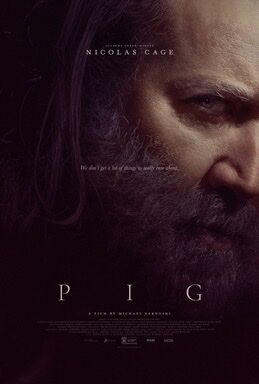Relationships
Pig: A Modern-Day, Dark Fairy Tale
On life force and love at its core. A film review.
Posted February 24, 2022 Reviewed by Lybi Ma
Key points
- Loss can break your heart, yet not break your soul.
- Resilience is a capacity built into all of us, though our ration of this priceless ingredient may not be evident until tested.
- Passage from the heights of fame to the depths of anguish can be redemptive.
- Trauma makes for breaking you or surviving it, letting “life go on”?
“Ob-la-di, ob-la-da" Nigerian for Life goes on

There are moments that can break any person: Death of a loved one, utter disgrace, injustice, loss of faith. What makes for the breaking and what makes for surviving it, letting “life go on”?
Pig is a 90-minute film that can break your heart, yet not break your soul. The film calls for soldiering on, whatever life may deliver, heartache notwithstanding. We have here a parable about human resilience, which calls for prodigious fortitude extending over more time than you want to imagine. Resilience is a capacity built into all of us, though our ration of this priceless ingredient may not be evident until tested by merciless, knock-you-down happenings. Actors can have a field day.
Robin Feld (a virtually unrecognizable Nicholas Cage) portrays a hermit, a dissolute man, in whom grit might be what we would least expect.
Mr. Cage’s recent films may dampen enthusiasm to see him again. Don’t fall into that trap. This film gives Mr. Cage an opportunity to demonstrate his range as an actor. He was nominated for an Oscar for his starring role in Pig, where his role does not permit him to crack a smile.
Pig, the animal star of the film, is a truffle hunter, who lives in the wilderness with Robin. They are each their significant other. Their quotidian sustenance derives from harvesting and selling the most exquisite of truffles to the closest thing I know to a drug dealer, who drives a bright yellow, Camaro muscle car. This “dealer’s” product, however, is not a drug that destroys a life; rather, it is truffles, which can make life sublime when cooked into the most heavenly of meals. Chefs rule in Pig. Don’t look at the right side of the menu.
Robin’s Pig is adorable (to the extent a pig can be), making the impact of the blow ahead take us down, or, maybe, absorb the blast and soldier on. So goes the surprising plot of this somber film.
The setting is the grand forests that surround Portland, Oregon, counterpointing abundant natural magnificence with a life made pale by catastrophe, and the misery it evokes. The irony is as vast as the mountains that fill the screen.
Caution: Viewing this film invites the viewer, not only the fictional characters, to descend into the maw’s despair, an exercise that parallels Robin’s passage from the heights of culinary fame to the depths of anguish. Not much fun, but if you can make it, this road stands to be redemptive, for you as well. Like a practice run to hell and back.
Life indeed can and does go on, with its mélange of shards of pain and uplifting glimpses of beauty and grace. Love is found by living, and pummeled in the ruins of death.
Mr. Cage is impassive: His life is hermitic, save for his truffle pig. He needs no more, yet loses what seems to be all he has to the greed that surrounds him. His unyielding, deadpan face, paucity of words, and capacity to express punishing pain are remarkably delivered. He shares the screen with Amir (Alex Wolff), the young dude in the Camaro, dressed for material success. His humanity, too, flowers, paralleling that of Robin, during the course of their brief road trip in search of the lost pig. They both are seeking the light that will illuminate their dark paths. Don’t hope for a ‘happy ending’, because that will hurt more. Brace yourself for calamity. Pig is a fictional parable that mirrors the reality and truth of our actual lives.
The film was written and directed by Michael Sarnoski in his directorial debut. His literary imagination is disquieting, all the more so for his direction. Mr. Sarnoski sets a slowly resolute pace, whose denouement cannot be stopped.
Pig, the film, has a separateness and uniqueness from the legion of tragic and redemptive tales we are told or shown, in one medium or another. Pig is more like a modern-day, dark fairy tale with a life force and love at its core. Which makes it no different from life on earth.


